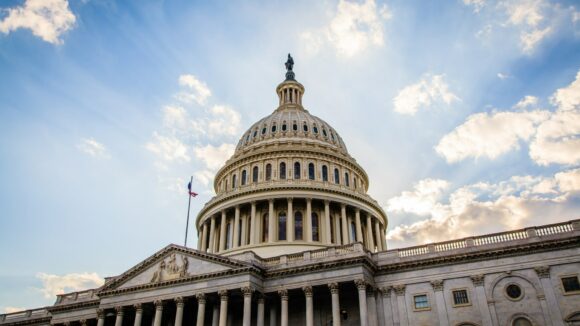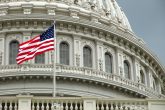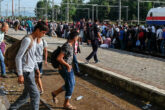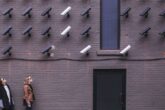September 09, 2020
Sharper: The Next Congress
The U.S. Congress is a fundamental pillar of American foreign policy and national security. When the 117th Congress is sworn in next January, legislators have the opportunity to exert substantial influence on the future of America's role in the world. CNAS experts are evaluating both the formal and informal tools available for Congress to perform its essential policy, budgetary, oversight, and administrative responsibilities. Continue reading this edition of Sharper to explore their recommendations for how legislators can best utilize Congress’ powers to defend and advance U.S. national security.
Reports
Congress’s Hidden Strengths
On matters of peace and war, virtually no one seems satisfied with Congress today. Even lawmakers complain that Congress postures more than it prescribes, overlooks more than it oversees, and passes time more than it passes laws. Experts Richard Fontaine and Loren DeJonge Schulman argue in a CNAS report that it is time for Congress to rediscover its informal tools and put them to work. Examining such informal tools as hearings and briefings, congressional delegations and reports, media engagement and public speaking, the authors outline the scope for increased congressional influence over use-of-force decisions—and describe ways in which members can seize the opportunity.
Reforming the Department of Homeland Security Through Enhanced Oversight & Accountability
18 years into its existence, the Department of Homeland Security (DHS) conducts extensive activities to protect national security, but its oversight and accountability functions have not matured commensurate with those responsibilities. In a CNAS report, expert Carrie Cordero outlined the pressures placed on the department’s immigration enforcement, border security, and law enforcement components, and recommended that Congress take more substantial steps to modernize the department’s legal authorities and legislate changes that will bolster DHS’s internal controls.
Renewing the National Security Consensus in Congress
The Center published its Key National Security Issues for Congress policy brief series as a part of a major initiative, Renewing the National Security Consensus in Congress. Over the course of this series, CNAS released nine policy briefs on issues ranging as widely as bolstering congressional support for NATO and addressing America's national security workforce crisis. Each installment offered practical policy proposals for lawmakers and staff designed to enhance bipartisan cooperation in congressional national security oversight.
Congress’s Hidden Strengths
Introduction On matters of peace and war, virtually no one seems satisfied with Congress. Constitutionally coequal to the executive, the Congress often appears more an uneasy ...
Reforming the Department of Homeland Security Through Enhanced Oversight & Accountability
In a new report, Carrie Cordero outlines the pressures placed on DHS's immigration enforcement, border security, and law enforcement components....
Renewing the National Security Consensus in Congress
Commentary
Experts from across the Center have offered timely analysis on the future of congressional national security oversight.
- Carrie Cordero and Elizabeth Goitein warn in Just Security that "oversight and accountability of [the Department of Homeland Security] have lagged far behind."
- At last year's CNAS National Security Conference, expert Loren DeJonge Schulman moderated a discussion with Senators Josh Hawley (R-MO) and Chris Murphy (D-CT) about bipartisan legislative solutions to complex foreign policy challenges.
A Window to Rein in DHS
Oversight and accountability of this massive department have lagged far behind....
Renewing the National Security Consensus in Congress
Loren DeJonge Schulman discusses bipartisan solutions to complex foreign policy challenges with Senators Josh Hawley (R-MO) and Chris Murphy (D-CT)....
- "Yet for most of the past year," Peter Harrell writes in Just Security, "key legislative proposals to reform presidential emergency powers have excluded one of the most important and most frequently invoked authorities: the International Emergency Economic Powers Act, or IEEPA."
- Katie Galgano argues in The National Interest, "As Congress considers another coronavirus relief bill, it must not only build an effective and competent oversight mechanism, but also protect that oversight from interference by the executive branch."
The Right Way to Reform the U.S. President’s International Emergency Powers
There is growing discussion in Washington about potential reforms to presidential emergency powers, a debate that will only intensify as a result of the coronavirus pandemic. ...
The Next Coronavirus Relief Bill Must Address Massive Oversight Issues
As Congress considers another coronavirus relief bill, it must not only build an effective and competent oversight mechanism, but also protect that oversight from interference...
- "While Congress should continue to pursue legislative means," experts Richard Fontaine and Loren DeJonge Schulman write in The Hill, "it is the body’s relatively neglected informal toolkit that stands as the likelier path to influence."
- Chris Estep argues in Just Security, "Party term limits that have been in effect since the 1990s for committee chairs and ranking members prevent members of Congress from leveraging the full extent of their experience for better oversight, including on committees with jurisdiction over U.S. national security policy."
- At last year's CNAS National Security Conference, The Washington Post's Ellen Nakashima moderated a discussion about intelligence oversight, featuring The Honorable Mike Rogers, Representative C.A. “Dutch” Ruppersberger, and expert Carrie Cordero. Their conversation focused on setting intelligence oversight priorities, the importance of bipartisanship in intelligence oversight, and whether the intelligence committees are due for modernization.
Congress must use its tools to influence the decisions of war
With its informal toolkit, Congress can question existing military and political strategies and test assessments about how the fight is going....
For House, Senate National Security Committees, Stopgaps for Term Limits
The primary election season for the next Congress opens officially on March 3, as states from California to Arkansas begin counting votes for candidates vying for seats in the...
Fostering Bipartisanship in Intelligence Oversight
Experts and policymakers discuss setting intelligence oversight priorities, the importance of bipartisanship in intelligence oversight, and whether the intelligence committees...
In the News
Featuring commentary and analysis by Elizabeth Rosenberg, Carrie Cordero, Martijn Rasser, and Richard Fontaine.
Bill targeting banks over China's Hong Kong law passes U.S. Senate
The U.S. Senate unanimously approved legislation on Thursday to penalize banks doing business with Chinese officials who implement Beijing’s draconian new national security la...
Lawmakers question DHS crackdown tactics in protest cities
The military tactics utilized by Homeland Security officers to control protesters in Portland, Oregon, and other cities are being decried by congressional lawmakers and invest...
As Congress pushes ‘piecemeal’ AI bills, two lawmakers press for cohesive strategy
As anxiety over Chinese advancements in emerging technologies spikes in Washington, Congress is scrambling to pass legislation to shore up America’s position in the global rac...
Congress unlikely to check Trump’s power to start war with Iran
Last year, months before the United States killed a senior Iranian commander in a dramatic escalation of tensions in the Middle East, bipartisan majorities in both the House a...
Across the Center
On January 28, 2020, CNAS released a major independent assessment, “Rising to the China Challenge: Renewing American Competitiveness in the Indo-Pacific,” as mandated by Congress in the 2019 National Defense Authorization Act (NDAA). The report prescribes a comprehensive approach to competition with China and offers nearly 100 specific, actionable policy recommendations across seven critical vectors of American competitiveness.

Rising to the China Challenge
The United States and China are locked in strategic competition over the future of the Indo-Pacific—the most populous, dynamic, and consequential region in the world....
Read MoreThank you for registering! You will receive a confirmation email shortly. All CNAS events are free, open to the public, and viewable from cnas.org/live.
Stay up-to-date with report releases, events, major updates, and announcements from the Center for a New American Security.
More from CNAS
-
Sharper: National Security in a Divided Congress
Following the 2022 midterm elections, a new U.S. Congress was sworn in, resulting in a divided House and Senate with narrow margins. Key national security legislative items ar...
By Anna Pederson & Cameron Edinburgh
-
Western Hemisphere Migration is a Long-Term Challenge
Addressing western hemisphere migration should be a national and international priority....
By Carrie Cordero & Cris Ramón
-
The Lawfare Podcast: Klein and Cordero on the Latest FISA Numbers
To discuss the latest in FISA transparency news, the data and what it all means, Benjamin Wittes sat down on Lawfare Live with Carrie Cordero of the Center for a New American ...
By Carrie Cordero
-
Opportunity to Reform the Department of Homeland Security’s Biodefense Operations and Governance
If Russia were to engage in biological warfare against Ukraine, that act could embolden other countries to develop and use such weapons in other conflicts....
By Carrie Cordero & Asha M. George


















